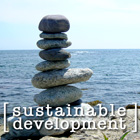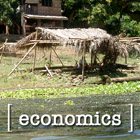
|
WHY WIND IS SMARTER Wind energy offers something no carbon-based fuel can offer: zero emissions, zero cleanup. It offers something nuclear infrastructure cannot: zero military security requirements due to long-range public health and security risks. It offers something no international energy market offers: local control and reasonable local supply everywhere on Earth. But this is only the tip of the iceberg. Wind power, also known as aeolic turbine power generation, is 100% non-climate disruptive and essentially infinitely renewable. The overall global wind resource far exceeds our capacity even to harness or to use it. In the year 2003, the Earth Policy Institute reported that Pentagon-commissioned research had found that just 3 wind-rich midwestern states possess sufficient wind resources to power the entire US economy with existing wind-turbine technology. Lester Brown, the Institute's director, in the new updated edition of his landmark Plan B (Plan B 2.0, coming in 2006), outlines a transition from the carbon-based energy economy to an entirely new age in global economics: the renewable energy economy. He points out that gas-electric self-recharging hybrid automotive engines and state of the art wind-energy-extraction turbines have laid "the foundation for a new transportation energy economy" (191), technologies which applied to energy production will greatly reduce the need for carbon-based fuels. There is another, perhaps unseen, benefit to developing wind-energy-extraction as a major power-generation infrastructure: the development itself. The global network of supplies, suppliers, generators and trading, still needs to be built, in large part. Huge numbers of new jobs will be created during the industrial development boom associated with building the renewable energy economy: science stemming from research will help to yield new advances in many areas, and markets will begin to set prices according to actual market capacity, instead of being distorted by massive subsidies and impending resource scarcity. The knowledge and the technology exist already to take great steps, and some nations have already committed to being renewable pioneers. Denmark, for instance, is the leading producer of wind-turbine technology, a move it consciously made in anticipation of increasing worldwide need for its products, and Germany has aggressively begun shifting much of its power-generation to wind turbines distributed across its vast but densely tilled green farmlands. Where infrastructural lag keeps costs above where technology would set them, tax policy can reduce the cost of wind energy to its rightfully low level, while correcting for the high costs of petroleum and other fossil fuels. Sweden has already begun shifting income taxes to a tax on environmentally destructive behavior. China, even as it pushes the automobile as a means of spurring economic growth, has imposed registration taxes in Shanghai equivalent to twice the city's average per capita income. Governments are finding it increasingly harder to pay for, or to justify paying for, the huge indirect short- and long-term costs of carbon-dependence. So some are finding it useful to shift those costs to those who directly opt for carbon-based fuels over renewable ones. And this can move markets, pushing consumer tendencies toward cleaner, more sustainable fuel resources. In the US midwest, family farmers —increasingly crunched by the costs of fuel and power generation, and overwhelmed by competition from big corporate farms— are beginning to opt out of agribusiness buy-outs and escape takeovers by supplementing harvest income and government subsidies with wind turbine installations. They take up relatively little land, do not disrupt planting or harvesting and can power the farms, all while still allowing owners to "sell back" excess power to the local utility grid, at a profit. Localizing energy generation is inherently more efficient, as is a system where market rates are partly determined by "buy back" prices and where utilities need not pay the high overhead costs associated with being the sole source of electricity for an entire region. Maintenance and equipment costs are spread out, base electricity rates become more competitive, less money and less energy are wasted and ideally the system as a whole is more closely monitored and maintained, at a lower cost. At present, there is a growing chorus of anti-renewable lobbyists and pundits in the UK and in the US, arguing that government-backed efforts to produce new nuclear plants offer far better hopes of reducing carbon emissions, but their claims are vague, their information incomplete, and their conclusions flawed. For instance, it has been repeated in recent days, as Tony Blair "floats" the idea of new nuclear plants —in a country committed to eliminating them altogether—, that there is not enough wind in Britain to provide even modest improvements in supply. In fact, numerous studies show that the UK enjoys abundant wind resources. The British Wind Energy Association is cited reporting UK offshore wind could cover total energy market "three times over", onshore wind "five times over". The primary obstacle remains lack of infrastructure and lack of heavy investment in full development of the resource for energy-production. Wind is not only more plentiful, cleaner and more efficient, it also answers a fundamental qualm running through global markets: costs of living and commodities-trading platforms can be corrected, liberated from the intense distortion of the carbon economy, leading to far greater long-term stability and prosperity. [s] |
|||||||||||||||||||||
|
||||||||||||||||||||||







